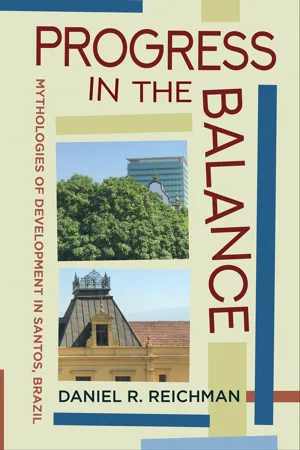
- 204 pages
- English
- ePUB (mobile friendly)
- Available on iOS & Android
About this book
Through a historical ethnography of Santos, Brazil, Progress in the Balance addresses and assesses an anthropological theory of progress. Observing that anthropology is a progressive discipline with a pessimistic attitude towards progress, Daniel Reichman explains the contested meanings of progress in Brazil and explores how anthropologists and others can define this concept more generally. He investigates how any society can separate "progress" from plain old change and, if change is constantly happening all around us, how and why certain events get lifted out of a normal timeframe and into a mythic narrative of progress.
Each chapter outlines a particular episode in the history of Santos, a city undergoing an unprecedented period of economic and political turmoil, as it is represented in public culture, mainly through museums, monuments, art, and public events. Drawing on the anthropology of myth, Reichman proposes a model that he refers to as a "clash of timescapes." Progress in the Balance shows how this concept of "progress" requires a different temporal structure that separates sacralized social change from mundane historical events.
Frequently asked questions
- Essential is ideal for learners and professionals who enjoy exploring a wide range of subjects. Access the Essential Library with 800,000+ trusted titles and best-sellers across business, personal growth, and the humanities. Includes unlimited reading time and Standard Read Aloud voice.
- Complete: Perfect for advanced learners and researchers needing full, unrestricted access. Unlock 1.4M+ books across hundreds of subjects, including academic and specialized titles. The Complete Plan also includes advanced features like Premium Read Aloud and Research Assistant.
Please note we cannot support devices running on iOS 13 and Android 7 or earlier. Learn more about using the app.
Information
Table of contents
- Preface
- Acknowledgments
- Note on Terminology
- Introduction
- 1. Spectacles of Colonialism
- 2. Coffee of the Past, Coffee of the Future
- 3. Port of the Past, Port of the Future
- 4. Sacralizing the Sewer
- 5. Citizen of the World, King of All Nations
- Conclusion
- Notes
- References
- Index